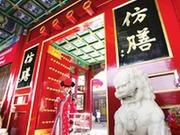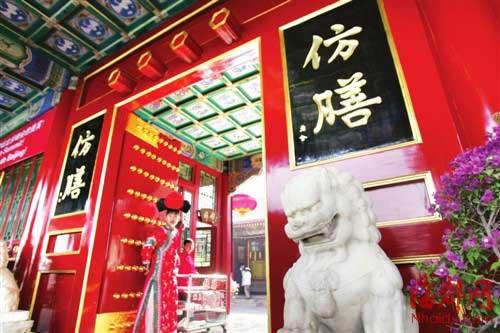Lavish restaurants and clubs in city parks to close

 0 Comment(s)
0 Comment(s) Print
Print E-mail CNTV, January 17, 2014
E-mail CNTV, January 17, 2014
China is following up on its latest anti-corruption campaign which was rolled out last December. This time, the country is targeting extravagant restaurants and clubs located at public city parks. With over priced menus, a lot of these restaurants cater to government officials who dine with a "shadow income."
 |
|
No luxury clubs in parks. |
My colleague Zhong Shi joins me now in the studio with more details.
Q1. Zhong Shi, we're seeing a consistent fight against corruption crossing into the new year. What can you tell us about this latest round of crack downs?
Zhong Shi: You're right Dongning. Ever since the country's leadership rolled out the eight-point regulation rejecting extravagance back in December 2012, China has been coming down hard on activities that see rampant corruption. Just last year, the country made a series of activities off limits for its officials, including accepting membership cards, taking holiday gifts, holding lavish bureaucratic meetings and so on. By September last year, close to 15,000 cases around China involving actions that go against the 8-point regulation were investigated and more than 16,000 people punished. The latest in that campaign is an order from the Central Commission for Discipline Inspection of the Communist Party of China at the end of last year to shut down exclusive and expensive restaurants built in public parks where corrupt officials like to frequent.
At this upscale restaurant located in Beijing's picturesque Zizhuyuan park, a meal used to cost 500 yuan, or about 80 dollars, per head. But now?
This gentleman tells us his simple meal cost just 38 yuan, almost nothing compared to his last visit.
"We previously positioned our restaurant in the high to medium end. Not so much the case now." Li Xuefeng, manager of Wenyuelou Restaurant, said.
The changes came after Beijing moved to shut down all lavish restaurants and clubs in its public parks.
With their discretion in location and services, these upscale venues served as an alternative after the country's thrift campaign made it difficult for officials to squander public funds at more public places.
Official vehicles would often take down or block their license plates on arrival, to protect the identity of the customers.
An initial investigation counted 24 such venues in Beijing's city parks. And a discipline inspection official says they must all go.
"We welcome tips from the public in identifying venues like these. We will investigate all the places we uncover." Zhao Yuqi, Beijing Discipline Inspection official, said.
The probe into these high-end venues continues. Officials say they hope their efforts will curb corruption, and return the city parks to the ordinary people.
Many Beijing residents say they welcome this measure because these restaurants take up park land that belongs to the city's people. Dongning?
Q2. Zhong Shi, besides those discreet services and exuberant banquets you mentioned, how do corrupt officials benefit from coming to these venues?
Zhong Shi: Well, each restaurant or club operates a bit differently, but most of them benefit corrupt officials in two ways. They either pay for the services, banquets, massages, sports activities - you name it - with public funds they embezzle. Or they accept membership cards from a third party who bribes them not with cash, but with more secretive high-end services at exclusive locations. The city's next step is to locate three types of similar venues. Those located inside city-owned parks and protected archaeological sites; those that take up an organic component of a city park or archaeological site--such as old pavilions and ancient buildings--as part of their structure; and those lavishly decorated but cater only to the rich and powerful.





